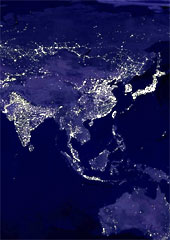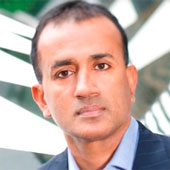Is the 21st Century the Asia Century?
Why should Asia rethink its adoption of the consumption-based economic model of the West?
June 28, 2012

All the talk in the West is about an Asian century. This sentiment is essentially rooted in the belief (and/or the fear) that Asia will become the engine of global economic growth and that its two largest countries, China and India, will come to dominate the world in more ways than one.
This way of looking at Asia is not only archaic, it is perverse. It constitutes a partial rejuvenation of almost colonial-era thinking — that Asian economies exist to preserve the economic dominance of the West, irrespective of the consequences to the region.
Like it or not, decisions taken in Asia will decide the future of the world — but not for the reasons people commonly think. Nowhere is this more important than in the choice and expectations of lifestyles. If Asia seeks economic, military, and thus geopolitical dominance in order to mimic Western lifestyles, it will lead to sorry outcomes for the entire world.
But an Asian century, defined as such, is also not in the cards because it simply cannot be the way the world is shaped in the 21st century. Why not? Because the 21st century will be like no other, due to the convergence of four major factors — factors that will require a very different look at how human progress is to be managed and defined.
First, in this century human population will peak for the first time ever. In the extreme case, more people will be added (about eight billion) to the planet over the next 80 years than ever before in human history.
To be clear, more people may be added to the global population this century than there are humans alive today, after thousands of years of human history. Even if this staggering number is undershot, it would clearly outpace the capacity of natural systems to sustain the species unless we are very clever and austere.
The United Nations’ new Global Environmental Outlook report on the state of the planet provides a stark warning of dire consequences. Yet it hardly captured global headlines, which were more concerned with the economic woes of the eurozone. Human civilization seems asleep at the wheel.
Second, CO2 levels will, for the first time in human history, reach levels that will alter the climate as we know it. This is bound to significantly affect the conditions and the ways human beings have organized themselves over several thousand years. The distribution of flora and fauna will change, thereby disrupting the natural order as we know it.
Third, technology has advanced to such a point where human beings are now able to live way beyond their means. We live in the era of technology overreach. Humans are now able to reach every corner of the globe in pursuit of economic gain — from deepwater drilling for oil and fracking for natural gas to arctic mining and deep sea fishing.
And humans can squeeze what they want out of natural systems to maintain a growth model that fundamentally thrives on underpricing resources and externalizing the true cost of goods and services. Worse, even though we have the technology to exploit just about any resource imaginable, these advancements really only serve the needs of the top 20% of (global) consumers, thereby deepening the disenfranchisement of the vast majority.
It doesn’t help that, despite our much-vaunted progress, we have still developed very few technologies that have gained global acceptance and scale to help us to live within our means.
And fourth, amidst all of this we are witnessing the crumbling of the sacred edifice of the Western economic model, around which the modern world was built over the last three centuries. Wherever one lives, the eurozone crisis and the economic woes in the United States certainly do not help to make these economies more resilient or forward-thinking in solving ever more pressing global problems.
In commenting on the Greek crisis, Christine Lagarde, the managing director of the IMF, said it was payback time for Greeks who have lived beyond their means. What she did not say is that the fate of this nation of seven million (or less that half the population of Beijing or Mumbai) does not just demonstrate the fragility of the global financial architecture. It symbolizes the end of the economic model that allowed people in the West to live beyond their means for a century or more.
None of that mattered until now — when billions of others in the developing world are attempting to have similar lifestyles as people in the West, given the globalization of everything from labor to finance to resource utilization.
Far from any sense of triumphalism, Asia must become aware that the same problems will eventually hit the region — but on an even more massive scale — if it follows the same route to growth with a focus on material “progress” and if it buys into the myth that there are no constraints to consumption-led growth.
Of course, many Asians now want to believe that they are uniquely equipped to make that major leap forward on a massive scale and at the same time save the global economy. But no matter their apparent resilience, it is only a matter of time — and the impact felt will be severe.
What does this all mean? Asia has to take responsibility and stop looking at the future of the region (and the world as a whole) through the lens of the Western world, especially the United States, and its narrow historical experience. The UN report is a good starting point to begin a rethink.
Editor’s note: This essay was adapted from the author’s presentation at the 2011 Salzburg Trilogue. Hosted by the Bertelsmann Stiftung in Germany, the Salzburg Trilogue facilitates international cultural dialogue by bringing together recognized public figures to consider matters of global importance.
Takeaways
If Asia seeks economic, military, and thus geopolitical dominance in order to mimic Western lifestyles, it will lead to sorry outcomes for the entire world.
Western-style problems will eventually hit Asia — if it follows the same route to growth with a focus on material "progress."
Asia has to stop looking at the future of the region (and the world as a whole) through the lens of the Western world.
